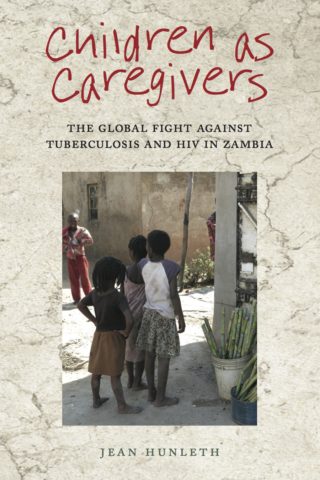Article begins
The Elliott P. Skinner Book Award celebrates its tenth year and eleventh award.
The Elliott P. Skinner Book Award continues to receive the attention of publishers and authors after its inception ten years ago in 2008. The annual book award was named in memory of Elliott P. Skinner, the Franz Boas Professor of Anthropology at Columbia University and US Ambassador to Upper Volta (Burkina Faso), for his scholarly and diplomatic accomplishments.
In 2018, we deliberated on our eleventh book award. Books continue to be of high quality, often combining theoretical and methodological sophistication and innovation, and having geographical diversity in representation. Jean Hunleth’s Children as Caregivers: The Global Fight against TB and HIV was chosen as the winner of the 2018 award. Children as Caregivers is a highly engaging, detailed, compassionate, and patient book in which Hunleth examines children’s relationships with parents infected with TB and/or HIV in Zambia. Hunleth employs a varied methodology that provides dimension and compelling evidence for her arguments that children shape global health in ways not previously well documented and that children are more agentive than previously imagined all while also experiencing significant interdependence with the adults for whom they care. Hunleth documents well the significant contributions children make to the persistence of households in the face of illness, as well as how children negotiate the gendered divisions of labor and access to resources. Despite the parent’s infectious disease(s), she found that children sought closeness and offered care giving to parents in hopes that they would recover. Children viewed their future and their chances of receiving an adequate education as being intertwined with the survival of their parent(s). Jean Hunleth is a research scientist in Public Health at the Washington University School of Medicine. Children as Caregivers is a volume in the Rutgers Series in Childhood Studies.
Ellliott P. Skinner Book Award finalists were George Paul Meiu for Ethno-erotic Economies: Sexuality, Money, and Belonging in Kenya and Kenda Mutongi for Matatu: A History of Popular Transportation in Nairobi. These books will be profiled in a future column.
The 2018 Elliott P. Skinner Book Award committee included: Betty J. Harris (University of Oklahoma), Chair; Rogaia Abusharaf (Georgetown University-Qatar); Maria Cattell (Field Museum of Natural History); Jennifer Coffman (James Madison University), AfAA President; and Gwendolyn Mikell (Georgetown University).
We continue to consider books on the boundary of anthropology that interconnect with areas of the African diaspora. While all geographical areas of Africa were represented in this year’s nominations, we seek more submissions from North Africa. The deadline for nominations and submissions for the 2019 competition will be on May 15, 2019. For details about this award and other AfAA awards, please see the AfAA website at: http://afaa.americananthro.org/
Demystifying the AAA Annual Meeting submission process
It’s time to think about your submission for the 2019 AAA meetings. As always, we encourage anyone submitting a paper, poster, session, or roundtable that deals with Africa, the African Diaspora, or issues relevant to Africanist anthropology, to consider channeling your submission through AfAA. Roundtable panels remain a very popular venue, as they encourage audience participation—something that meeting attendees have indicated is very desirable. Roundtables typically have four or five presenters who speak to a theme for about 5–7 minutes each, and then the floor is open to discussion moderated by the roundtable chair.
We work hard to put timely and relevant panels together from submitted papers, and have an excellent track record of getting our submissions on the program. Please do keep in mind that submissions to the Annual Meeting are peer reviewed. During the review process, we rank all submissions, and the top-ranked ones are assured a place on the program, while there’s a chance the lowest ranked ones will not be accepted for the program. To help us get your paper on the program, make certain that your abstract is clearly written and that it indicates how your research contributes to theoretical, applied, or humanistic understandings. A strategy that we lay out each year and which can give your submission a strong advantage is to speak directly to the theme of the Annual Meeting. This year’s theme is “Changing Climates.” You can find more information on the AAA website. If you are interested in seeking invited status for your panel, please communicate with us well before the deadline. If we agree to pursue invited status for your panel, we like to begin seeking a co-sponsor early. While the AfAA is allotted two invited sessions, we can extend that with co-sponsorship (e.g., we can work with other sections to agree to co-sponsor sessions with us, and then agree to co-sponsor sessions submitted to other sections, so that we effectively have four invited sessions on the program). This increases the visibility of AfAA and helps us to build membership.
It is through dues that we are able to award prestigious prizes for books and scholarly papers, as well as host our reception and social events. If you are not a member of AfAA, please consider joining when you renew your AAA membership. And please visit our website for information about AfAA and our awards. If you have any questions contact AfAA Program Editors David Turkon at [email protected] and Kristin Hedges at [email protected].
Betty Harris is chair of the Elliott P. Skinner Book Award Committee.
Please send column ideas, photos, research updates, and other AfAA relevant info to Christian Vannier ([email protected]).
Cite as: Harris, Betty, Kristin Hedges, and David Turkon. 2019. “AfAA Elliott P. Skinner Book Award Winner and Call for Participation.” Anthropology News website, February 20, 2019. DOI: 10.1111/AN.1097


